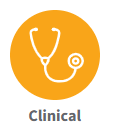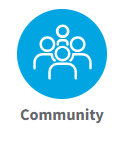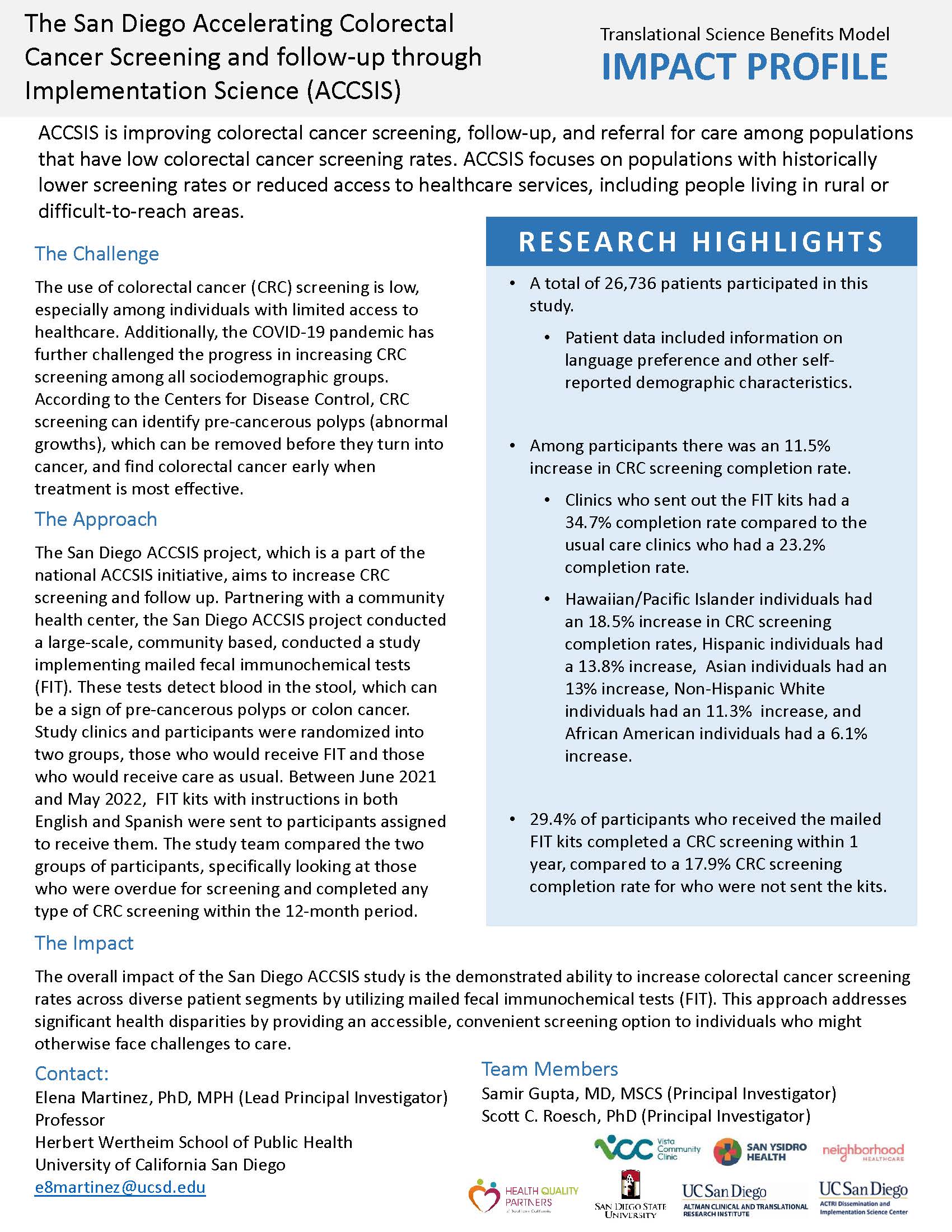 The San Diego Accelerating Colorectal Cancer Screening and follow-up through Implementation Science (ACCSIS)
The San Diego Accelerating Colorectal Cancer Screening and follow-up through Implementation Science (ACCSIS)
Summary
ACCSIS is improving colorectal cancer screening, follow-up, and referral for care among populations that have low colorectal cancer screening rates. ACCSIS focuses on populations with historically lower screening rates or reduced access to healthcare services, including people living in rural or difficult-to-reach areas.
The Challenge
The use of colorectal cancer (CRC) screening is low, especially among individuals with limited access to healthcare. Additionally, the COVID-19 pandemic has further challenged the progress in increasing CRC screening among all sociodemographic groups. According to the Centers for Disease Control, CRC screening can identify pre-cancerous polyps (abnormal growths), which can be removed before they turn into cancer, and find colorectal cancer early when treatment is most effective.
The Approach
The San Diego ACCSIS project, which is a part of the national ACCSIS initiative, aims to increase CRC screening and follow up. Partnering with a community health center, the San Diego ACCSIS project conducted a large-scale, community based, conducted a study implementing mailed fecal immunochemical tests (FIT). These tests detect blood in the stool, which can be a sign of pre-cancerous polyps or colon cancer. Study clinics and participants were randomized into two groups, those who would receive FIT and those who would receive care as usual. Between June 2021 and May 2022, FIT kits with instructions in both English and Spanish were sent to participants assigned to receive them. The study team compared the two groups of participants, specifically looking at those who were overdue for screening and completed any type of CRC screening within the 12-month period.
The Impact
The overall impact of the San Diego ACCSIS study is the demonstrated ability to increase colorectal cancer screening rates across diverse patient segments by utilizing mailed fecal immunochemical tests (FIT). This approach addresses significant health disparities by providing an accessible, convenient screening option to individuals who might otherwise face challenges to care.
Key Benefits
 |
Diagnostic Procedures – Demonstrated
By using FIT, the study improved the availability and use of effective diagnostic methods. The early detection of cancer through such reliable tools enhances patient care and aligns with this benefit.
|
|
|
 |
Healthcare Accessibility – Demonstrated
The San Diego ACCSIS study successfully increased access to colorectal cancer screening for key populations, directly contributing to improved healthcare accessibility. By providing at-home tests, it made screening more accessible to those who may have limited access to healthcare facilities.
|
|
|
 |
Disease Prevention & Reduction– Demonstrated
Encouraging cancer screening helps prevent the progression of colorectal cancer, especially among high-risk groups. The use of FIT increased the rate of CRC screening completion, further demonstrating its capabilities in prevention and reduction of colorectal cancer through early detection.
|
|
|
 |
Health Care Quality– Demonstrated
The San Diego ACCSIS mailed intervention improved the quality of health services by increasing screening rates through the use of FIT and ensuring more timely diagnosis, which leads to better patient outcomes, demonstrating a direct improvement in care.
|
|
|
 |
Life Expectancy & Quality of Life– Potential
If FIT is successful in preventing or catching colorectal cancer early, it could lead to improved life expectancy and quality of life for participants, particularly in certain populations where early detection may not otherwise occur.
|
|
|
 |
Cost Savings– Potential
If widely adopted, mailing FIT kits could reduce the costs associated with in-person screenings and later-stage colorectal cancer treatments by catching the disease earlier when it is less expensive to treat. This could lead to significant cost savings for healthcare systems and patients in the long term.
|
Additional Resources
- Martínez, M. E., Roesch, S., Largaespada, V., Castañeda, S. F., Nodora, J. N., Rabin, B. A., Covin, J., Ortwine, K., Preciado-Hidalgo, Y., Howard, N., Schultz, J., Stamm, N., Ramirez, D., Halpern, M. T., & Gupta, S. (2024). A pragmatic randomized trial of mailed fecal immunochemical testing to increase colorectal cancer screening among low-income and minoritized populations. Cancer, 130(18), 3170–3179. https://doi.org/10.1002/cncr.35369
- Castañeda, S. F., Gupta, S., Nodora, J. N., Largaespada, V., Roesch, S. C., Rabin, B. A., Covin, J., Ortwine, K., Preciado-Hidalgo, Y., Howard, N., Halpern, M. T., & Martinez, M. E. (2023). Hub-and-Spoke centralized intervention to optimize colorectal cancer screening and follow-up: A pragmatic, cluster-randomized controlled trial protocol. Contemporary clinical trials, 134, 107353. https://doi.org/10.1016/j.cct.2023.107353
- ACCSIS Website: https://accsis.rti.org/
Funding Statement
The National Cancer Institute Cancer Moonshot-funded the Accelerating Colorectal Cancer screening and follow up through Implementation Science (ACCSIS) grant (1UG3CA233314-01A1/5UH3CA233314-04) to the University of California San Diego Moores Cancer Center and San Diego State University (Martínez, Roesch, Gupta, MPIs).
